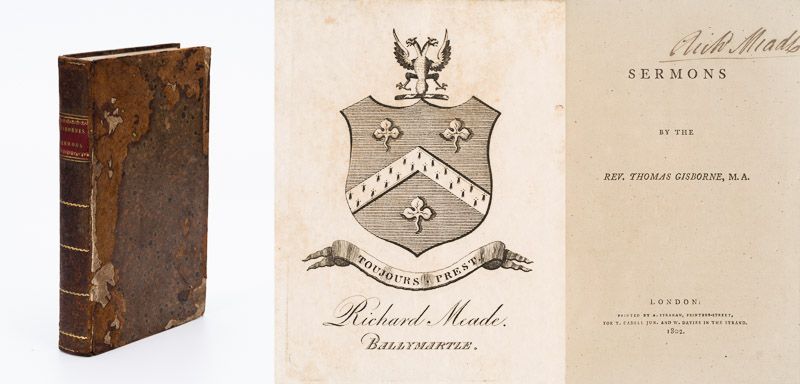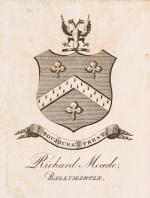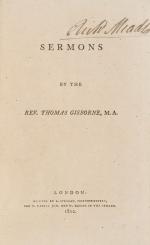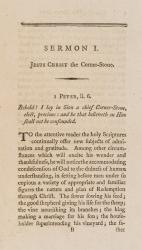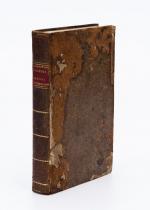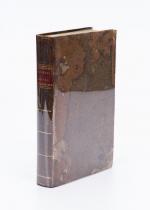Gisborne, Sermons.
Sermons.
London, Printed by A. Strahan for T. Cadell Jun. and W.Davies in The Strand, 1802. Octavo. XV, 453 pages. [Layer with pages 23- 26 loosened but included]. Hardcover / Original 19th century full-leather with gilt ornament and original spine-label. Binding rough with stronger signs of rubbing and defects to the leather-covered – boards. But the binding is firm and holding. From the library of Richard Meade (Ballymartle), with his Exlibris / Bookplate to pastedown.
Sermon I: Jesus Christ the Corner-Stone
Sermon II: The Christian Method of Justification explained and vindicated
Sermon III: On the Nature and Efficacy of Divine Grace
Sermon IV: On the Nature and Effiucacy of Divine Grace
Sermon V: On the Nature and Effiucacy of Divine Grace
Sermon VI: On the Marks which distinguish a real Christian
Sermon VII: On the Duty of openly ranging ourselves on the Side of the Lord
Sermon VIII: On the Sin of dissembling with God
Sermon IX: On the Nature and the Consequences of Excuses for not giving up the Heart to Religion
Sermon X: On Steadfastness in Obedience to God
etc. etc.
20 Sermons in total
Thomas Gisborne (31 October 1758 – 24 March 1846) was an English Anglican priest and poet. He was a member of the Clapham Sect, who fought for the abolition of the slave trade in England.
Gisborne was born at Bridge Gate, Derby, the son of John Gisborne of Yoxhall Lodge in Needwood Forest, Staffordshire and his wife Anne Bateman. He was educated at Harrow and entered St John’s College, Cambridge in 1776, where he established lifelong friendships with William Wilberforce and Thomas Babington. At Cambridge, he became the first Chancellor’s medallist in 1780.
In 1783 he became curate of Barton-under-Needwood, and later that year inherited Yoxall Lodge, Staffordshire, which was 3 miles from the church. The next year he married Mary Babington (b. 1760), only sister of Thomas Babington. They had six sons and two daughters. The eldest son, Thomas Gisborne (1794–1852), became a member of parliament, and the fourth son, James, a clergyman, succeeded his father as perpetual curate of Barton in 1820.
Gisborne was a central figure in the Clapham Sect, an abolitionist group which included William Wilberforce and Gisborne’s brother-in-law Thomas Babington. Yoxall Lodge acted as a major focus of the group, and Wilberforce was a frequent visitor there.
Gisborne was appointed prebendary of Durham Cathedral in 1823. He died at Yoxall Lodge on 24 March 1846 at the age of eighty-seven. Gisborne left money for an annual scholarship at the University of Durham, which is referred to as the Gisborne Scholarship.
Gisborne’s Principles of Moral Philosophy (1789) was a forceful evangelical attack on William Paley’s Principles of Moral and Political Philosophy (1785), an influential work studied at both Cambridge and Oxford Universities, arguing morality as a categorical imperative against Paley’s utilitarian standpoint. Gisborne also wrote Enquiry into the Duties of Men (1795) and Enquiry into the Duties of the Female Sex (1797) stressing subordination to the divinely imposed social hierarchy. His Walks in a Forest (1794) was a book of poems describing the scenery of Needwood Forest, which bordered his estate at Yoxall. (Wikipedia)
- Keywords: Catalogue No.7 – Religion · Religion – Rare
- Language: English
- Inventory Number: 31419AB
EUR 105,--
© 2025 Inanna Rare Books Ltd. | Powered by HESCOM-Software




